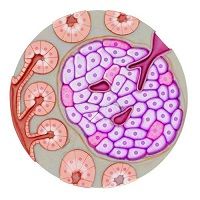Article
UDCA Supplementation Enhances Lipid Digestion and Absorption in Pancreatic Insufficient Patients with Cystic Fibrosis
Author(s):
Researchers evaluated the effects of ursodeoxycholic acid supplementation on nutritional status in patients with mild liver disease.

Results from a trial involving 23 cystic fibrosis patients with pancreatic insufficiency and mild liver involvement indicate that supplementation with ursodeoxycholic acid can increase the digestion and absorption of fat.
Investigators used a 13C-mixed triglyceride breath test to evaluate fat digestion in patients who took ursodeoxycholic acid and again, in those same patients, after a month without the supplement. Compared to abstinence, the use of ursodeoxycholic acid resulted in a significant increase in cumulative percentage dose recovery (median increase over baseline, 4.6%; interquartile range [IQR], 0.4% to 6.0%, p < 0.00046).
Some patients used both ursodeoxycholic acid and varying amounts of supplemental pancreatic enzymes, a combination that further improved fat metabolism and absorption. Indeed, when the investigators increased enzyme doses in in 16 patients with abnormal 13C-mixed triglyceride breath test results and lipase dose less than 3000 U/g of fat, cumulative percentage dose recovery increased further, (median increase over baseline, 8.6%; IQR, 5.6% to 12.7%; P<0.000027).
The results of ursodeoxycholic acid supplementation were temporary, however. A month without the enzyme saw a significant reduction in fat digestion (P<0.000031) and absorption (median elevation over baseline, 2.9%; IQR, 0.7% to 5.8%).
“Ursodeoxycholic acid supplementation seems to enhance lipid digestion and absorption in pancreatic insufficient cystic fibrosis patients with mild liver involvement,” the investigators wrote in the European Journal of Gastroenterology & Hepatology. “This finding points toward the potential impact of ursodeoxycholic acid supplementation on nutritional status in cystic fibrosis patients with liver disease and underscores the often overlooked role of factors other than pancreatic enzymes on digestion and absorption of fats in cystic fibrosis.”
Ursodeoxycholic acid is a secondary bile acid, created by intestinal bacterial from the primary bile acids that are produced by the liver and stored in the gall bladder.
A handful of earlier studies have noted a relationship between ursodeoxycholic acid and exocrine pancreatic function in both animals and humans. For example a 1986 study that appeared in Digestive Diseases and Sciences reported that supplementation stimulated bicarbonate output in rats and rabbits. A 2010 study published in the Journal of Clinical Investigation even found that ursodeoxycholic acid supplementation improved outcomes in ferrets that had been genetically altered to develop cystic fibrosis.
“Severe malabsorption by the gastrointestinal tract was the primary cause of death in CFTR-knockout kits that escaped the meconium ileus,” the investigators wrote. “Elevated liver function tests in CFTR-knockout kits were corrected by oral administration of ursodeoxycholic acid, and the addition of an oral proton-pump inhibitor improved weight gain and survival.”
However, a Cochrane Database Systematic Review published in 2014 found little evidence that systematic ursodeoxycholic acid supplementation improved outcomes in humans with cystic fibrosis. The authors of that review found only 3 randomized controlled trials that compared ursodeoxycholic acid against placebo or no additional treatment for at least 3 months. A total of 118 patients took part in the trials, which tested doses of the acid ranging from 10-20 mg/kg/day and ran up to 12 months.
“There was no significant difference in weight change (mean difference, 0.90 kg; 95% CI, 1.94 to 0.14 kg) based on 30 participants from 2 trials. Improvement in biliary excretion was reported in only 1 trial and no significant change after treatment was shown. There were no data available for analysis for long-term outcomes such as death or need for liver transplantation,” the review authors wrote. “There is insufficient evidence to justify its routine use in cystic fibrosis.”




